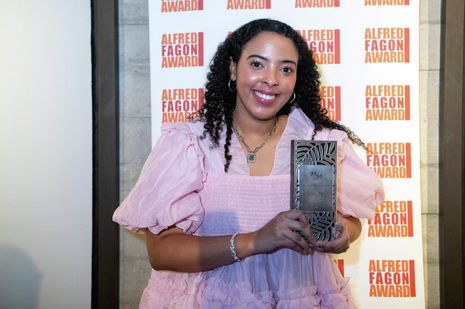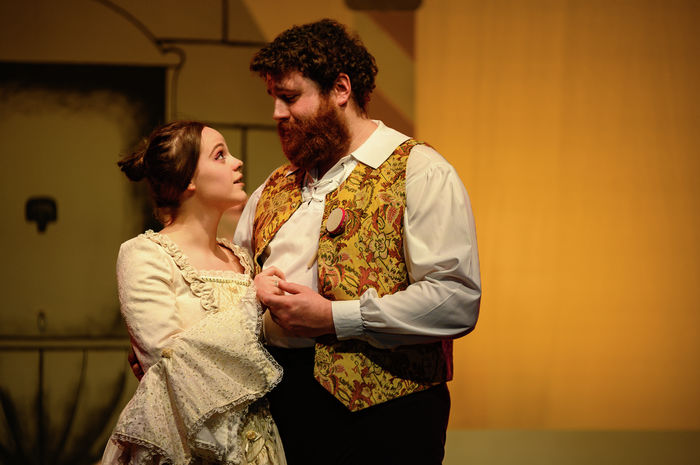‘Football, fathers, friendship’: Chakira Alin’s award-winning play Heroes
Co-producer Lotte Brundle sat down with Chakira Alin to talk all things Heroes – Chakira’s double award-winning play that is making its debut at the ADC Theatre next week

Content Note: This interview contains a discussion of knife crime, and brief mentions of addiction, poverty and lone-parent families
The process of co-producing Heroes this term has been so rewarding and this, I think, is first and foremost a testament to the sheer beauty and authenticity of the script. Writing a play can’t be easy, but Heroes playwright Chakira Alin has truly made it seem effortless. Last week I caught up with her to get a better understanding of the chain of events that transpired to bring this wonderful new piece of theatre to Cambridge this February.
LB: So, the first question I have for you is, what inspired you to write a play in first place?
CA: I had always wanted to write one. I wrote it specifically for The Marlowe Other Prize, so the deadline was coming up, I missed it in first year and I really wished I’d done it, and I just ran out of time. So, for second year I thought I’d try to write one. And it was when we were doing Lent Term from home, so I thought, well, I have no social life right now, so I’m going to knuckle down and write a play. Yeah, I just thought it was perfect timing really!
LB: Heroes, as well as having moments of lightness and comedy, discusses quite a lot of dark themes – important themes – are these themes that are personal to you?
CA: Yeah, so it’s all about East London, which is where I’m from, and I started with football – so that’s not a dark theme at all – it’s a really fun one! But then, related to that, I started thinking about issues that happen in inner-city areas: so knife crime, addiction, poverty, lone-parent families: this is just the world I grew up in. In particular, knife crime is something I feel has risen a lot recently – every day I’ll hear about someone who has been stabbed.
“I wanted to try to take theatre out of the middle-class dining room and onto the estate”
So, it’s just something that is often at the forefront of my mind. And you get used to it and you can become kind of, numb to it, and I realised that actually this doesn’t happen everywhere. I thought it was a normal thing, but it’s not, and that’s why I wanted to speak about it: because you never hear about that stuff in a play. Maybe for good reason as it’s quite dark, but it does happen. I wanted to try to take theatre out of the middle-class dining room and onto the estate. But it all started with football really, that was the main driving force.
LB: So, I guess coming off of that, the follow up question I have is: Cambridge is a really middle-class place, how do you feel about staging a play with that background in this environment?
CA: I actually think it’s really funny that Heroes is having its debut in a place like this, which historically is so shut off to the people I’m writing about. I remember submitting it to The Other Prize, and thinking, ‘You’re not going to win!’ I was really worried, wondering if they’d even understand it. But I think, people in Cambridge can find something in it hopefully. I know it’s very different from what they’re used to, but I think that’s good – a shock to the system. Let them have it.
LB: My next question is: why football? Are you a footballer?
CA: I’m not a footballer – I wish! That’s like my pipedream. I wish I was a footballer but I actually grew up 5 minutes away from West Ham Stadium; I would pass it on my way to and from school. My dad used to take me, he was a season-ticket holder. Football is what I think of when I think of my dad. I wanted to write about fathers and I thought, ‘What do I closely associate with my own father?’ – and it was always football.
“Hearing these characters I made in my head come to life was amazing”
LB: I know that you’ve been involved with the casting process and choosing the production team: how have you found that?
CA: So, I was really nervous about finding the crew because, similar to my hesitancy about staging it in Cambridge, I didn’t know if anyone would get this play, if anyone would care about it. But thankfully I found Thea [Co-Producer], you, Dixie [Director] and Izzy [Assistant Director]; Izzy and Dixie are amazing at what they do: such great directors. The first cast read through, hearing these characters I made in my head come to life was amazing.
LB: Finally, could you briefly summarise what Heroes is about for Varsity’s readers?
CA: The three ‘F’s’: Football, fathers, friendship. It’s about a young man in East London who’s never met his dad, and then, one fateful Father’s Day, he gets to meet him for the first time, and the play follows the fallout from that meeting, and how that reverberates into the rest of the community. That’s all I’ll say, I don’t want to spoil it, so you’ll have to come and see it!
Heroes plays at the ADC Theatre Cambridge from 23rd -25th February at 11pm
 News / Caius mourns its tree-mendous loss23 December 2025
News / Caius mourns its tree-mendous loss23 December 2025 News / Clare Hall spent over £500k opposing busway 24 December 2025
News / Clare Hall spent over £500k opposing busway 24 December 2025 Comment / The ‘class’ of Cambridge24 December 2025
Comment / The ‘class’ of Cambridge24 December 2025 Comment / Yes, I’m brown – but I have more important things to say22 December 2025
Comment / Yes, I’m brown – but I have more important things to say22 December 2025 Interviews / Politics, your own way: Tilly Middlehurst on speaking out21 December 2025
Interviews / Politics, your own way: Tilly Middlehurst on speaking out21 December 2025










